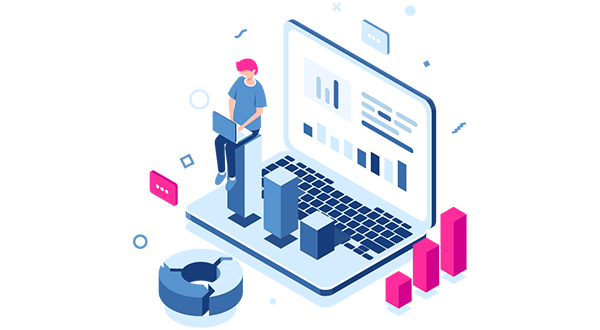

Healthcare Life Sciences (HCLS)

Welcome to the Future of Health Care Life Sciences Technologies
Accelerate innovation and digital transformation with our leading-edge solutions for complex modernization and petabyte-scale big data
The health care industry stands on the brink of a technological transformation, ushered in by an unprecedented era of digital innovation. Health care professionals and IT architects are the leaders in managing the intricate infrastructure and advanced computerized systems that are vital to patient care and data management.
mLogica’s automated modernization tools, powered by generative artificial intelligence (GenAI) and machine learning (ML), are designed to accelerate innovation and lead digital transformation to the cloud in health care.
mLogica’s GenAI-based technologies play a key role in the health care/life sciences (HCLS) vertical for both modernization and analytics. Health care organizations have a wealth of data, such as patient medical records, pharmacy records and biomedical research that are scattered in disparate sources. Examples can include:

Primary health care and vaccinations:
Government and multinational organizations such as the U.S. Centers for Disease Control and National Institutes of Health, the World Health Organization, the UK National Health Services and more receive data from thousands of sources and support populations of millions, making them one of the largest repositories of critical health information.
Laboratory diagnostics and phlebotomy: Most hospitals and independent labs generate and process large amounts of data on a daily basis, with end users of this data both within and outside these organizations. This raises a variety of concerns over timely processing of high volumes of disparate information, data consistency and security and regulatory compliance.
Genomics and cancer care: Comprising patient, provider, pharmaceutical and insurer data on millions of individuals, these are two of the fastest-growing specialty areas in medicine, ones that also present extraordinarily high demands for data processing accuracy, speed and confidentiality. mLogica offers purpose-built, GenAI-powered solutions to help customers migrate and securely store genomic data in the cloud, accelerating secondary and tertiary analysis and integrating genomic data into multi-modal datasets.
Radiology: With a multitude of new diagnostic and interventional technologies, radiology is a fast-evolving specialty. It also presents unique data management challenges due to the wide and increasing array of file formats, the need to make images immediately shareable for consultations and stringent security and regulatory compliance requirements.
Population Health: Population health management considers many factors influencing public health, including medical care, social and physical environments, disease control, genetics and individual behaviors. Modernizing legacy technology allows providers to improve clinical health outcomes through optimized care coordination and patient engagement strategies.
Additionally, the ability to effectively ingest and process petabyte-scale mixed data to derive near-real-time insights is critical to guiding population health management programs by supporting holistic analytical insights that are not possible when viewing data sources in isolation.
mLogica Technologies Support Leading-edge Health Care Informatics
Our GenAI/ML-driven legacy and mainframe modernization solutions and big data and managed services platforms optimize technology, database management and high-volume data analytics for all health care requirements:
STAR*M Distributed Workload Modernization: This software suite seamlessly automates the modernization of legacy applications to modern on-premise or cloud platforms.

LIBER*M Mainframe Modernization Suite: LIBER*M automated modernization allows health care organizations to jettison their outdated mainframes and leverage next generation agile technology on demand in the cloud.

CAP*M Complex Events Analytics Platform (CAP*M CEA): Our big data platform, CAP*M CEA empowers health care institutions to overcome the limits of their legacy systems with petabyte-scale data ingestion and near-real-time processing of mixed data for leading-edge informatics and truly data-driven decision making.

TRAK*M Managed Services Platform: TRAK*M provides the critical IT monitoring and management you need to ensure system stability and reliability.

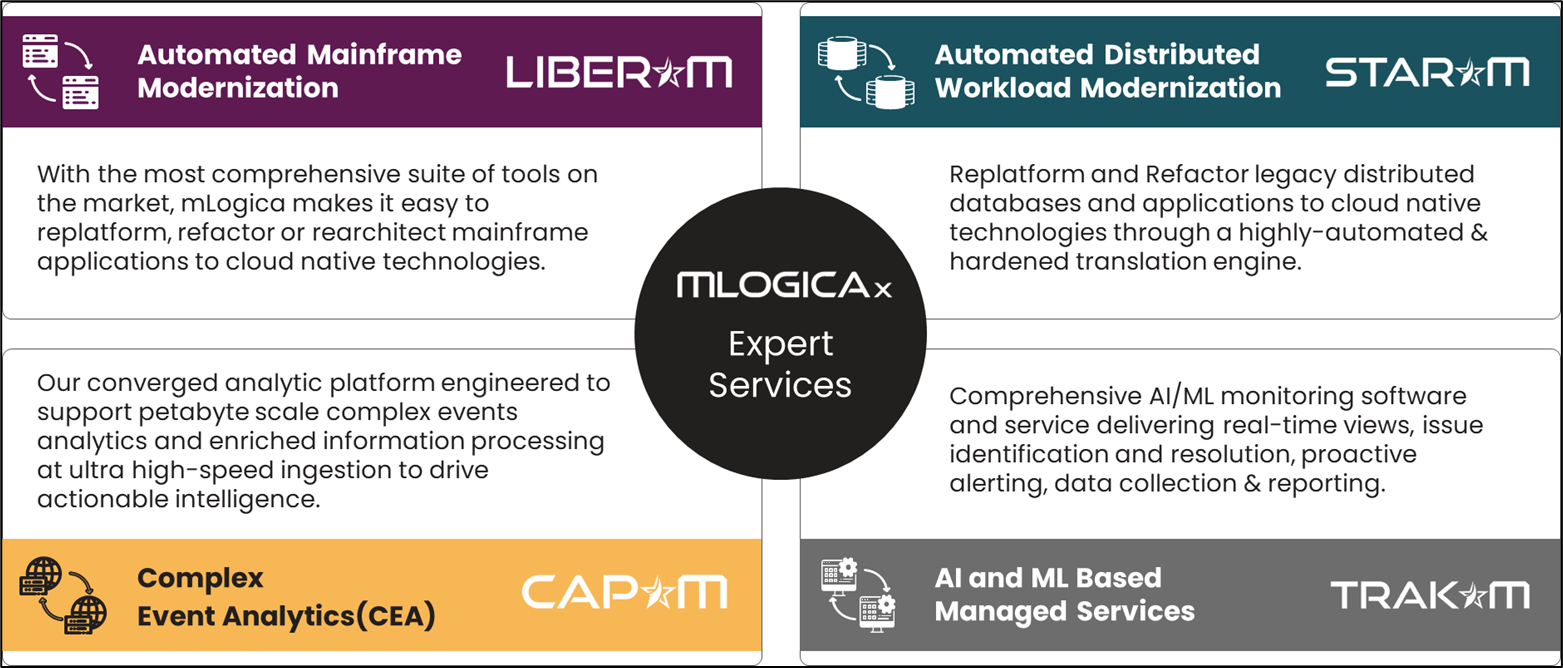

Modernization to the Cloud Drives Enhanced Health Care Informatics
mLogica’s automated modernization software suites let health care and life sciences organizations optimize informatics by unlocking the full value of historical and incoming data with streamlined workflows, faster data accessibility and enhanced collaboration.
Our GenAI/ML-powered STAR*M Distributed Workload Modernization and LIBER*M Mainframe Modernization Suite solutions let health care organizations migrate to the cloud faster and at a lower cost, modernizing their IT infrastructure while eliminating frustrating inefficiencies associated with outdated systems.
Postgres-based cloud platforms offer scalability, flexibility and agility, allowing faster data processing, smoother operations and on-demand incorporation of innovative cloud technologies.
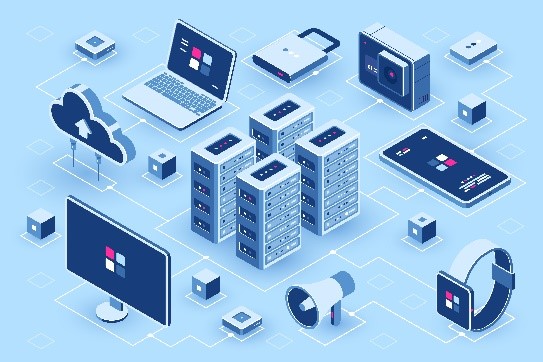
Cloud Technologies Support the Unique Needs of Health Care
Cloud-based solutions provide greater accessibility to health care data for authorized users across an array of locations and devices, promoting collaboration among providers, researchers and administrators for better-informed decision-making and improved patient care.
Leveraging mLogica’s automated modernization technologies, cloud migrations enable near-real-time consultation and data sharing among health care providers, specialists and patients. Sharing data stored securely in the cloud, authorized users can access and collaborate on patient records, test results and treatment plans from any location, facilitating coordinated care and reducing errors.
mLogica Health Care Modernization Success Stories
U.S. Government Health Agency – Migrating Analytics to the Cloud
The health care industry stands on the brink of a technological transformation, ushered in by an unprecedented era of digital innovation. Health care professionals and IT architects are the leaders in managing the intricate infrastructure and advanced computerized systems that are vital to patient care and data management.
The Customer, a U.S. government health agency that provides public health, medical and social services nationwide, was using a legacy on-premise data warehouse and business intelligence (BI) application that could no longer fulfill their evolving business needs.
First, the data warehouse was not truly enterprise-wide, as key data was siloed, making it difficult for users to leverage in decision making. Second, the system was unable to solve important use cases involving multiple data subject areas because it lacked the scalability needed to introduce new data sources.
Third, the data warehouse and BI toolset were antiquated and incapable of supporting modernized artificial intelligence/machine learning (AI/ML) or integrating with the different BI/visualization tools being used across all agency branches. Finally, the agency’s on-premise infrastructure was cumbersome and costly to maintain.
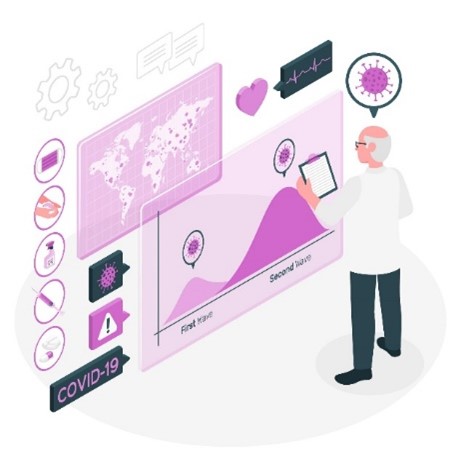
Transforming complex database environments requires next generation technology and industry expertise, especially when dealing with sensitive information. By engaging mLogica’s expert teams and solutions, the Customer established an administrative data hub in the cloud that offers infrastructure-as-a-service (IaaS) benefits, improves data integration, provides the foundation for AI/ML technologies and solves critical agency use case issues. To learn more, click here.
Cloud-based Advanced Analytics Powers Health Care Informatics
The health care vertical is experiencing an explosion of data due to the increased digitization of health records, the proliferation of wearable devices and the use of electronic health monitoring systems. This data comes in various forms and formats, including structured data such as electronic health records, imaging data and test results, as well as unstructured data such as doctor's notes, patient feedback and social media data.
Managing and analyzing this massive amount of data is a complex task that requires sophisticated tools and techniques. Migrating to the cloud opens opportunities to integrate with some of mLogica’s advanced technologies such as our GenAI- and ML-powered CAP*M Complex Event Analytics Platform big data solution.
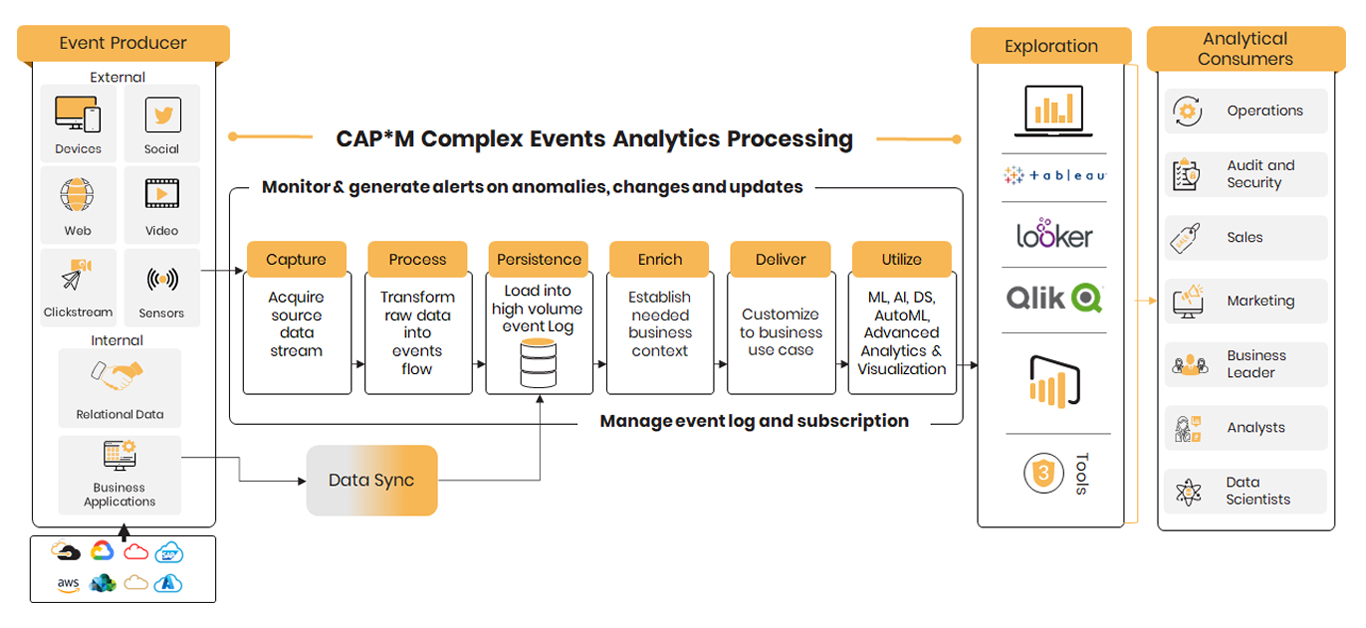
Optimal clinical decision-making depends on providers’ ability to access all relevant information in near-real-time, from structured files like spreadsheets and lab reports to unstructured data like images, clinical notes and more. According to RBC Capital Markets, between 2020 - 2025 the total amount of global health care data is projected to increase from 2,300 to 10,800 exabytes, an annual growth rate of 36%—faster than virtually any other industry.
This skyrocketing volume, and the need to manage such data in a secure environment, are key challenges for health care providers worldwide. mLogica’s CAP*M Complex Events Analytics Platform (CAP*M CEA) allows fast ingestion and precision analysis of petabyte-scale mixed data in near-real-time with leading-edge security.
CAP*M CEA aggregates, processes and analyzes petabyte-scale streams of data at high speed to provide near-real-time insights into events as they occur. It coordinates access to data from multiple sources throughout all phases of clinical development to identify risks early, allowing all relevant information to be made available to providers and decision makers.
Enriched, high-speed ingestion and processing means patients can be diagnosed using comprehensive data from diagnostic results, blood work and even community health statistics. Images from X-rays, MRIs and CT scans and more can be triaged for disease and prioritized for expert radiologists to analyze in near-real-time.
As providers seek to improve patient outcomes, reduce costs and operate more efficiently, high speed processing of big data is critical to improving quality of care, reducing costs and improving population health. In addition, CAP*M CEA’s predictive analytics features can outline all treatment options, along with likely outcomes, for a higher degree of success at the point of service.
Our fully customizable CAP*M Complex Events Analytics Platform can scale up capacity to scores of petabytes or more of mixed data. Clinics can access health records from anywhere at any time, giving providers virtually unlimited options, including on-demand peer consultations, instant access to patient test results and more. CAP*M’s ability to process petabytes of data in near-real-time also allows stakeholders to detect trends, patterns and correlations in mixed data, helping providers make lifesaving, data-driven decisions.
CAP*M CEA ADVANCED ANALYTICS FOR HC/LS
CAP*M Complex Event Analytics enables the mobilization of health care information across organizations within a community, region and even nationwide, while placing the patient at the center of the health care ecosystem. It also enhances the security, privacy and interoperability of confidential health data.
Related Case Studies
- https://www.mlogica.com/resources/mlogica-case-studies/major-north-american-health-care-complex%E2%80%94managed-services-for-sap-ase-and-replication-server
- https://www.mlogica.com/resources/mlogica-case-studies/e-health-solution-provider-%E2%80%93-migration-of-administrative-e-health-solution-to-java-jee-architecture
- https://www.mlogica.com/resources/mlogica-case-studies/mutual-health-insurance-organization-%E2%80%93-cost-reduction-of-legacy-applications
- https://www.mlogica.com/resources/mlogica-case-studies/us-government-health-agency-%E2%80%93-migrating-analytics-to-the-cloud
Related Blogs
For professional consultations or to learn more about our solutions, email us directly at Modernize-Now@mLogica.com.


